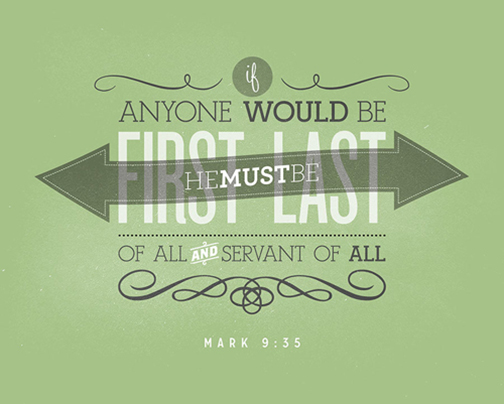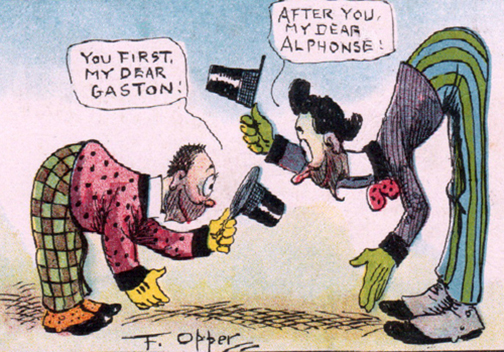
| “Anyone who wants to be first must be the very last, and the servant of all.” |
| —Mark 9:35 |
Very few readers of this blog post will have ever heard of the famous cartoon characters, Alphonse and Gaston. But, as a small boy, my grandmother used to tell me how much she enjoyed reading their comics back near the time she gave birth to my dad in 1907. A long time ago, to be sure.
Alphonse and Gaston were the creation of Frederick Burr Opper. He featured a decidedly bumbling pair of Frenchmen, who had a very distinctive penchant for extreme politeness.
Opper’s comic duo first appeared in William Randolph Hearst’s newspaper, the New York Journal on September 22, 1901, in a strip titled: “Alphonse a la Carte and His Friend Gaston de Table d’Hote.” What marked virtually every aspect of this renowned comic strip was some setup that required the pair to take an action that would inevitably be foiled by their insistence on being extremely polite.
One of the most famous of these comic strips featured the two trying to enter a doorway with each one insisting that the other precede him through the door. In fact, as they would bow to each other with particular grace, one would say, “After you!” To which the other would say, “No! After you!” This would go on for several panels, even several days.

My how times have changed. We live today in a decidedly inhospitable and discourteous society. Almost no one holds an entrance door for a woman anymore. In fact, just a few days ago, I held the door for a woman, who I would guess was probably in her mid-thirties. She cursed at me and made it clear that she was quite capable of opening her own door. She was actually angry that I had extended this courtesy to her.
Rarely when I say, “Thank you!” does the other party say, “You’re welcome.” If they say anything, it’s usually a somewhat curt “No problem.”
This American English idiom is likely a corruption of the Australian phrase: “No worries, mate!” or the Spanish phrase: de nada, which literally translates into English as “it’s nothing.” Contrary to the American English slang “No problem!” the phrase de nada, in the Spanish culture, is an indication of humility that basically indicates: “What I have done for you was my great pleasure to do so and, in fact, was really no effort on my part at all—it’s hardly worth mentioning.“
Likewise, the Australian phrase “No worries, mate!” holds the same kind of humble response as the Spanish phrase and, in the somewhat more relaxed Australian culture, has a similar purposeful meaning as the Spanish phrase. Said in more proper American English, the response to “Thank you!” would be “You’re welcome! It was a pleasure to serve you. What I did for you was no trouble at all.”
“You really are an old geezer aren’t you? You are definitely out of touch with the real world of today’s America.” someone might say. While I plead “guilty” to that charge, I still believe that the phrase: “No problem!” spoken with a bit of arrogance and curtness is profoundly different from much more appropriate: “You’re welcome!”
As Christians, Jesus taught his disciples—and us, as well—that we must give humble preference to others, rather than ourselves. Notice these words of our Savior recorded in Mark 9:35:
Sitting down, Jesus called the Twelve and said, “Anyone who wants to be first must be the very last, and the servant of all.”
The concept of “you first before me” pervades the entire philosophy of displaying the love of Christ to the world. Yet, I wonder if we get it? As we start another day, let’s try, for at least one day, to truly put others first in everything that we do. After a day, let’s review and see what we’ve observed. Did our actions make things better or worse? Are you with me?

Based on a blog originally posted on Monday, May 1, 2017